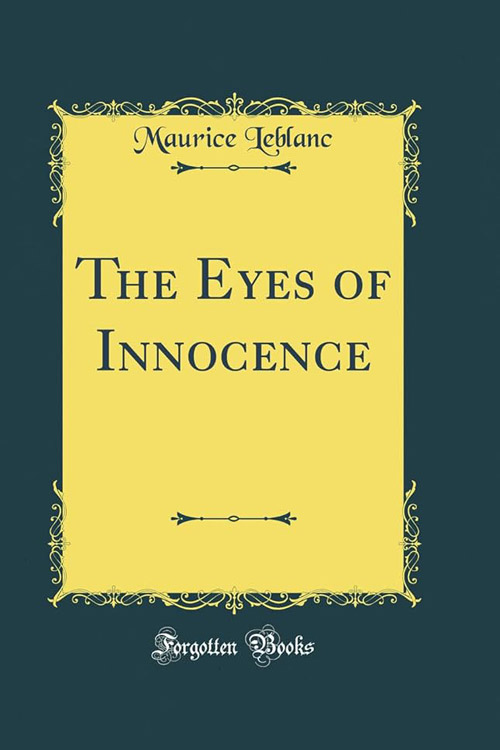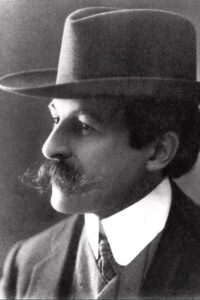
The Eyes of Innocence
A room in which she sobs for hours on end, heedless of all things, huddled in a bit of chair or on her knees before a white-curtained bed; people who come and go; a doctor who certifies the cause of death; aneurism of the heart, beyond a doubt; the lady of the house, who tries to comfort her; a commissary of police who puts questions which she is unable to answer and who makes her look in her mother’s trunks for papers that are not there: these are Gilberte’s lasting memories of those two dreadful days.
Then came the singing in the church, a long road between bare, wind-stripped trees, the graveyard, and the final and irrevocable parting from her who, until now, was all her life, her soul, her light…
Oh, the first night spent in solitude, those first meals taken with no one opposite her, and those long, interminable days during which she never stopped weeping—the big tears that come welling up from the heart as from a spring from which nothing can dry up! Alone, knowing nobody, what was she to do? Where could she go? To whom could she turn?
“The important thing,” insisted the lady of the house, who sometimes came to see her in her room, “is that you should have a solicitor. Mine is prepared to come whenever you please. I spoke to him about you, and there seem to be formalities. Remember what the commissary said about the papers…”
Gilberte remembered nothing, for she had listened to nothing. Nevertheless, the persistency of this advice, repeated daily and with such conviction, ended by persuading her, and, one morning, she sent to ask Maitre Duforneril to be good enough to call on her.
Maitre Duforneril had one of those calm and good-natured faces, the sight of which seems to soothe you at once. He thought attaching so much importance to the business would have made it impossible not to take at least some interest in it. Therefore, Gilberte was obliged to reflect, tax her memory, and, in short, reply.
Read or download Book
Maurice LeBlanc
Maurice Marie Émile Leblanc (11 December 1864 – 6 November 1941) was a French novelist and writer of short stories.
Biography.
He is best known for creating the fictional gentleman thief and detective Arsène Lupin, who is often described as a French counterpart to Arthur Conan Doyle’s Sherlock Holmes.
The first Arsène Lupin story appeared in a series of short stories that was serialized in the magazine Je sais tout, starting in No. 6, dated 15 July 1905. Created at editorial request, Leblanc may have also read Octave Mirbeau’s Les 21 jours d’un neurasthénique (1901), which features a gentleman thief named Arthur Lebeau, and he had seen Mirbeau’s comedy Scrupules (1902), whose main character is a gentleman thief.
By 1907, Leblanc had graduated to writing full-length Lupin novels, and the reviews and sales were so good that Leblanc effectively dedicated the rest of his career to working on the Lupin stories. Like Conan Doyle, who often appeared embarrassed or hindered by the success of Sherlock Holmes and seemed to regard his success in crime fiction as a detraction from his more “respectable” literary ambitions, Leblanc also appeared to have resented Lupin’s success. Several times, he tried creating other characters, such as private eye Jim Barnett but eventually merged them with Lupin. He continued to pen Lupin tales well into the 1930s.
Leblanc also wrote two notable science fiction novels: Les Trois Yeux (1919), in which a scientist makes televisual contact with three-eyed Venusians, and Le Formidable Evènement (1920), in which an earthquake creates a new landmass between England and France. Leblanc was awarded the Légion d’Honneur for his services to literature and died in Perpignan in 1941. He was buried in the Montparnasse Cemetery. Georgette Leblanc was his sister.
Life
Maurice Leblanc was the second child of Émile Leblanc, a 34-year-old ship-owner merchant, and of Mathilde Blanche (née Brohy), daughter of rich dyers, aged 21 and was delivered by Achille Flaubert, Gustave Flaubert’s brother. He had an elder sister, Jehanne (born in 1863), and a younger sister, Georgette Leblanc (born in 1869), who, from 1883 until the 1920s, was an actor and star operatic soprano. During the Franco-German War of 1870, his father sent Maurice to Scotland. Upon his return to France, he completed his studies in Rouen. The young Maurice received his first education in a free institution, the Patry Pension. Then, from 1875 to 1882, he completed his secondary studies at the Lycée Corneille. As a teenager, he frequently encountered Gustave Flaubert and Guy de Maupassant.
Refusing the career his father intended for him at a card factory, Maurice headed to Paris in 1888 to pursue writing instead. First a journalist, then a novelist and storyteller. His first novel, “Une femme” (A Woman), published in 1893, was very successful and was followed by other works, such as “Des Couples” (The Couples), “Voici des Ailes” (Here Are Wings) and his only play, “La pitié”, released in 1902, which is a failure, causing him to give up the theatre for a while. In 1901, he published “L’Enthousiasme”, an autobiographical novel.
In 1905, Pierre Lafitte, the director of the monthly Je sais tout, commissioned a short story from Leblanc in the vein of A.J Raffles by Ernest William Hornung and the adventures of Sherlock Holmes. The resulting “L’Arrestation d’Arsène Lupin” (The Arrest of Arsène Lupin) was a great public success. Two years later, the book Arsène Lupin, Gentleman Burglar was released, containing the first nine stories depicting the character published in the French magazine ‘Je sais tout’. The following book, Arsène Lupin versus Herlock Sholmes, a second collection of Arsène Lupin stories written by Maurice Leblanc, angered the Sherlock Holmes creator Conan Doyle, who saw Leblanc’s Herlock Sholmes and Wilson as parody characters designed to ridicule Doyle’s work.
Maurice Leblanc received the Legion of Honor on January 17, 1908, presented by the then Under-Secretary of State for Fine Arts, Étienne Dujardin-Beaumetz. While a supporter of French radical socialists and free-thinker in his early age, Leblanc became more bourgeois during the First World War. Leblanc started to grow weary of writing Arsène Lupin stories. As early as 1910, he tried to kill his hero in the story “813” but would resurrect the character in The Crystal Stopper.






